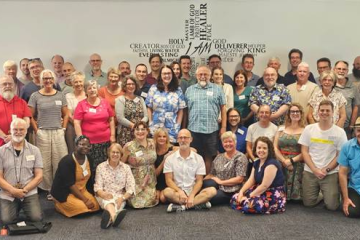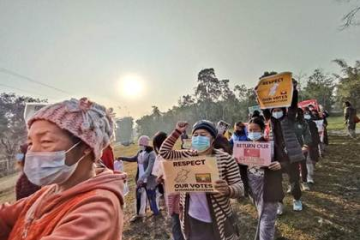Psalms of communal Lament – Psalm 137
On Friday morning, just as I was about to start this sermon on the communal psalms of lament, our third in this series, I had a call from BaptistCare who are writing a short piece on this church’s support for Tara’s Angels, the local programme that helps women who have escaped domestic violence to establish new lives and, at the end, the woman interviewing said, “Thank you! We think its amazing a church is willing to support a program like this.” I think she was being nice, but it seemed an odd comment, so I said, “Isn’t this what churches are meant to do – isn’t this our job – to support programs like this?” And she said, “Oh no, we find that churches are not as engaged in the world we actually live in. They prefer to give overseas, to ministries that are far away.”
That comment – that churches are not as engaged in the world we actually live in – is also why, according to Old Testament scholar Walter Brueggemann, we hugely neglect the communal psalms of lament. While we do not give lament psalms as a whole much attention, we slightly prefer the personal laments over the communal laments because, he says, “the personal, even psychological’ has become our mode of experiencing reality.” Our culture has become much more concerned with the individual, with individual identity, and so our faith has become a more privatistic faith. As a result, Brueggemann argues, “We have experienced …a loss of public awareness and imagination…. We have lost our capacity to practice prayer in relationship to public issues.”
The communal laments call us, yes, to lament our personal situations, but not to be limited by privatistic concerns, but to pray bigger, to lament bigger, to lament with others, to lament for others, to lament for the world that we know our world has not yet become.
Going back to Tara’s Angels, that is why we, as a church, support this kind of ministry. We do not want to be guilty of a loss of public awareness on this issue, of the appalling statistics on intimate partner violence – that one woman is killed every 9 days in Australia. And while domestic violence is complex, and affects men as well as women, we know it is gender inequality that affirms attitudes and behaviours that enable violence against women. We know gender inequality is a proper subject for our theological imagination – for lament.
On Wednesday a group of us met at the church for a lament writing workshop (it will be repeated on Zoom this Wednesday) and while most of us wrote personal laments, Rebecca Hilton wrote this – which although also personal is an example of a communal psalm of lament about gender inequality.
- God, why have you made some men feel that they have dominion and power over women.
- I am angry that my daughters will navigate a world where they are considered less than a man. In so many situations.
I am sad that our mothers and grandmothers did not get the same opportunities as men.
3.Yet I know that you have been with us, and you treat women equally to a man.
4.I want every woman to know her worth.
5.God, our world cannot function until all people are equal.
6.I want men to understand the hurt they bring to women by actions or inactions.
7.Give me a voice to speak for the silenced.
8.I want to use my voice for others.
9.Thank you God for giving me opportunity.
Our psalm for today, Psalm 137, is another example of a bigger prayer, a bigger lament. And yet, at first glance, we might be shocked, yes, by its violence and I’ll get to that in a moment, but also by its Jewishness. How can such a Jewish psalm, a psalm so concerned with a particular place, with Jerusalem, speak to the concerns of people throughout history, speak to our concerns?
We need to keep in mind that for the Jewish people, Jerusalem and the temple, in Brueggemann’s words, “was the point of reference for all of life. Its destruction thus meant the loss of a centre, and a profound public disorientation.” Perhaps we can think back to those first weeks of April this year when everything about the way we conducted our lives changed, we were told to work from home, to stay home, to not congregate with groups of any size. It was profoundly disorienting – and yet we were still in familiar surroundings and living in relative safety. This was not how those in exile felt.
Does this excuse the violence? Of course not. Every commentary I have looked at – Christian and Jewish – is shocked at the violence in this psalm. And yet they note that the psalm does not tell Jews to take this action against the ‘little ones’ of Babylon. Action, punishment, is left in the hands of God. And they also note the raw honesty of this cry to God, that the largeness of this lament, the intensity of this lament is such that, in Brueggemann’s words, it “must have energised fidelity for the long haul.”
For we have the story of Nehemiah, who, a century later, is so distressed at the account of the state of Jerusalem that he too, “sits down and weeps” for days. And yet this grief about Jerusalem does not lead to a privatistic piety or a ‘heavenly religion’ but commitment to “restoration , reconstruction and reorganisation of the city.” Brueggemann writes, “Nehemiah wept a century later as his forebears did in our psalm. It is remarkable that the memory and hope are kept so poignantly and immediately alive for so long, but that is the nature of our faith. Out of that history of weeping came resolve for new life.”
On Wednesday night as well, Rebecca read a lament written in the Mae La Refugee Camp on the Thai Burmese border when she and Gary Hilton and John Clark and Jeanette Mathews visited there in 2006. In an paper on lament that Jeanette wrote after that experience she speaks of how shy and emotionally reserved the Karen were, and yet reading their laments how she was “staggered the level of emotional outpouring that the poems evidenced”. Let me read you the lament that Rebecca read to us:
I was born in a beauty land
Full of dignity and happiness
I wish to stay in our home forever
And I want to depart never.
The army entered my village
On a silent day
Our fields were destroyed
and burnt the rice barn.
I was hungry
But no food to eat
I left my homeland
Settled in another land
I miss you every minute
Tears fall down on my feet
But still have hope
God will lead me home
I miss my homeland
Forever and never end
I want to go back
To beautify our land again
*Naw Htee Lah Hay, Ku, Me La Camp, September 2006)
We need to lament. And we need to lament big! We need to lament big because this is our most honest and intimate communication with a God who welcomes such communication, and because we need laments so emotionally staggering that they will sustain us, and sustain future generations, in our prayer, in our suffering, in our waiting and in our work for the long haul. Brueggemann writes, “It is important that generation after generation we remember with Jews [and we could add, with the poor, with refugees, with women, with all who experience violence, with the whole creation that is groaning] that the present arrangements are not right, not acceptable, and not finally to be accepted. Psalm 137 draws its power and authority out of another vision, marked by homecoming, which seems remote, but is not for one instant in doubt. There will be a homecoming to peace, justice and freedom.”
O come, O come Emmanuel and ransom captive Israel…
As we say the words of this hymn – the lament – responsively and the choir sing the chorus, we remember the hope that we celebrate, the presence of Christ with us, and the laments that remind us of the fulfilment of that hope in our world.


